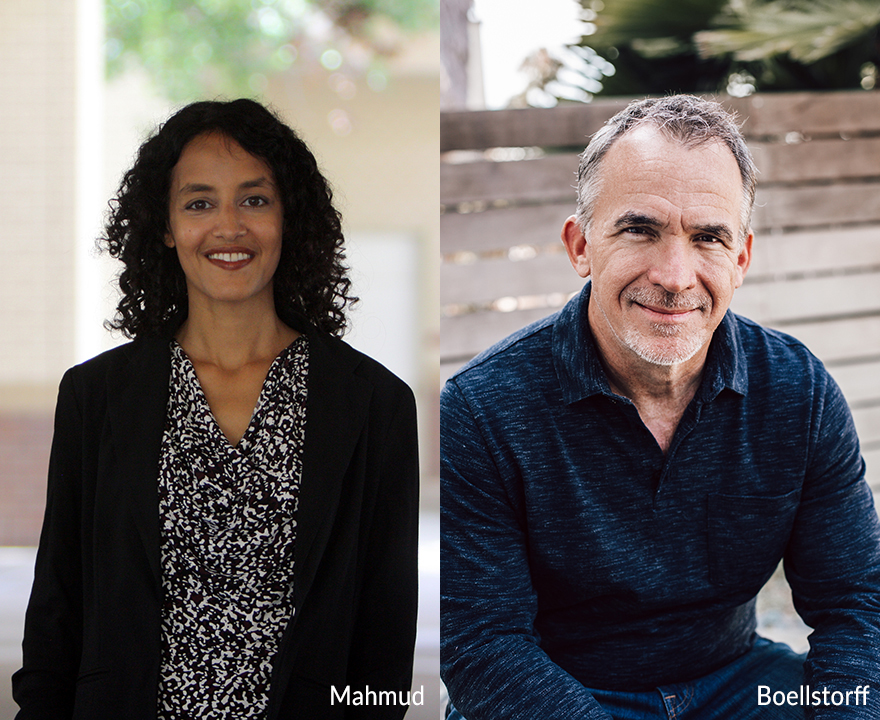Thoughts on Pride

Thoughts on Pride
- June 26, 2023
- UCI anthropologists Lilith Mahmud, associate professor, and Tom Boellstorff, professor, weigh in
-----
Pride is an opportunity to think about the past, present, and future, a chance to reflect on personal journeys and societal transformations. We honor Pride in June in commemoration of the 1969 Stonewall uprising in New York City, which marked a turning point in the movement for LGBTQ+ rights. Pride parades across the United States have since become joyous celebrations of our community’s beauty, creativity, and love of life. Like other persecuted groups who now have months dedicated to their heritage and memory, LGBTQ+ folks have in some ways been embraced by dominant American politics and its corporate sponsors. The very existence of Pride is a sign of how far we have come.
Yet the reality is far more sobering. It is both ironic and deeply disappointing, for instance, that at the beginning of this month, the Orange County Board of Supervisors voted to ban Pride flags on county property. This was accomplished indirectly, by allowing only government and military flags to be flown, but the debate clearly stemmed from a desire to erase LGBTQ+ citizens–not to mention undocumented queer people and migrants–from the imagined community of the polity. Despite fundamental political victories like the right to marry, visit our loved ones in the hospital, or adopt children, queer people are still marginalized in the United States.
As LGBTQ+ faculty, we celebrate Pride in recognition of the very real strides that make it possible for us to teach at UC Irvine without hiding who we are, but also as a time to name ongoing forms of discrimination that impact our LGBTQ+ students and colleagues. With regard to sexual orientation and gender identity, oppression is deeply linked to silence and invisibility, which in turn feed shame, isolation, and violence. So how do we come together in shared struggle, and imagine new forms of solidarity?
At a time when people are told to “vote with your wallet” and consumer capitalism too often passes for resistance, even at Pride events, we remember that buying rainbow commodities from one corporate store and avoiding chicken sandwiches from another may not be the path to liberation that our ancestors paved. Let’s not forget that the Stonewall riots erupted in response to police brutality against queer communities of color, and police violence is one of the defining civil rights issues of our time. Long before the Movement for Black Lives was formed, it was transgender Black and Latina women who led the way, alongside queer people of all races, in the LGBTQ+ fight for all of our lives. From poverty to mass incarceration, food insecurity, migration, discrimination in healthcare, employment, and housing, lack of access to legal papers, or physical and emotional violence, LGBTQ+ issues today are as diverse and as numerous as our community. This Pride month, let’s expand our definition of what counts as a queer issue. And let’s honor the legacy of Stonewall by recommitting ourselves to intersectional resistance against all forms of oppression.
Lilith Mahmud is an associate professor of anthropology at UC Irvine who earned a Ph.D. in anthropology from Harvard University and specializes in feminist anthropology and critical European studies. Tom Boellstorff is a professor of anthropology at UC Irvine and fellow of the American Association for the Advancement of Science. Boellstorff earned a Ph.D. in anthropology from Stanford University and specializes in research surrounding digital culture, sexuality, globalization, nationalism, language, and HIV/AIDS.
-----
Would you like to get more involved with the social sciences? Email us at communications@socsci.uci.edu to connect.
Share on:
Related News Items
- Careet RightThe 6 best video game books of 2024
- Careet RightIntellivision: How a Videogame System Battled Atari and Almost Bankrupted Barbie®
- Careet RightExplore the deep and distant past of Intellivision
- Careet RightCloser to the "real" thing -- How an ad campaign for a 1980s video game console helped shape our view of virtual worlds
- Careet RightI Dig UCI


